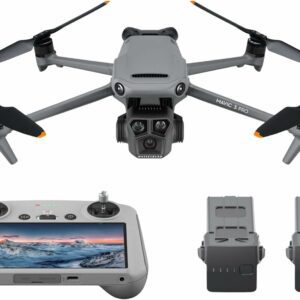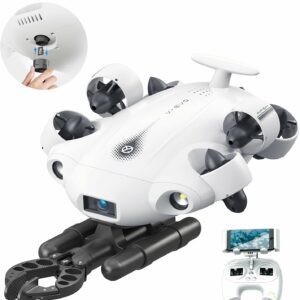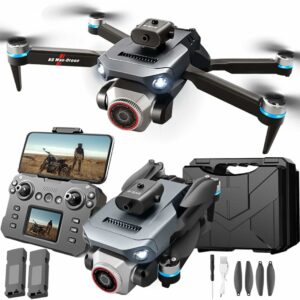Rescue & Emergency Drones
📸 What Are Rescue & Emergency Camera Drones?
Rescue and emergency drones are unmanned aerial vehicles (UAVs) equipped with high-resolution cameras, thermal sensors, and real-time transmission capabilities, built to support search and rescue (SAR), disaster response, fire detection, and emergency medical delivery.
These drones help locate missing persons, assess danger zones, and support time-sensitive operations with minimal risk to human responders.
Showing all 3 results

DJI Mavic 3 Pro – Triple-Camera Drone with 5.1K Video & Omnidirectional Obstacle Sensing
- Camera:
- Flight time (m):

FIFISH V-EVO 4K60FPS Underwater Drone with Robotic Arm – Explore the Depths with Precision
- Camera:
- Flight time (m):
🛠️ Key Features of Rescue & Emergency Drones
- Thermal and infrared cameras for night vision or heat detection
- High-resolution optical cameras for live situational awareness
- Loudspeakers and spotlight systems for communication in disaster zones
- Long-range and extended flight time for covering large areas
- GPS-based waypoint navigation and autonomous scanning patterns
- Real-time video transmission to control centers or rescue teams
- Weather-resistant and rugged build for extreme environments
🎯 Most Common Emergency & Rescue Applications
Search and Rescue (SAR) Missions
Quickly scan large areas for missing individuals, especially in forests, mountains, or flood zones, using thermal imaging and zoom cameras.
Disaster Relief & Damage Assessment
Deploy drones immediately after earthquakes, storms, or floods to evaluate affected zones, prioritize aid, and monitor structural damage.
Firefighting & Hotspot Detection
Use thermal drones to detect hotspots in wildfires or urban fires, providing firefighters with vital visibility in smoky or hard-to-reach areas.
Medical Supply & Emergency Kit Delivery
Send essential medications, AEDs, or communication devices to stranded or injured victims when traditional routes are blocked.
Crowd Monitoring & Public Safety
Monitor large-scale emergencies, protests, or evacuations from the air to help law enforcement coordinate responses effectively.
❓ Frequently Asked Questions (FAQs)
🔸 How do drones help in emergency situations?
They provide fast aerial views, locate victims with thermal imaging, assess dangers like fire or flooding, and guide responders with real-time data—often reaching places humans can’t safely access.
🔸 Can drones see in the dark or through smoke?
Yes, many emergency drones use thermal and infrared imaging to detect body heat, allowing visibility in darkness, smoke, fog, or dense vegetation.
🔸 Are rescue drones used by official agencies?
Absolutely. Fire departments, police units, coast guards, and disaster response agencies around the world deploy drones for SAR, damage evaluation, and logistical support.
🔸 How long can a rescue drone fly?
Flight time varies by model, but professional emergency drones typically offer 30–60 minutes of airtime and can be rotated with multiple batteries.
🔸 Can drones deliver life-saving supplies?
Yes, some rescue drones are capable of delivering small emergency kits, flotation devices, or medical tools to hard-to-reach areas.

